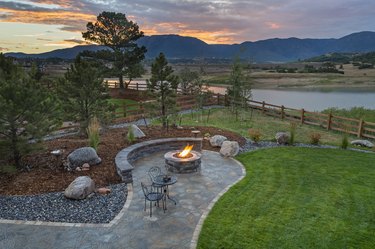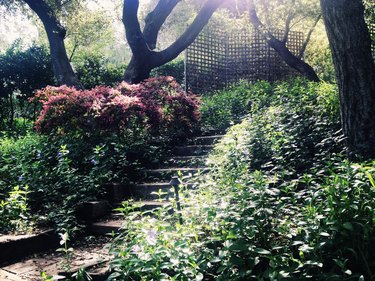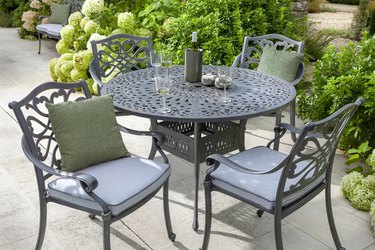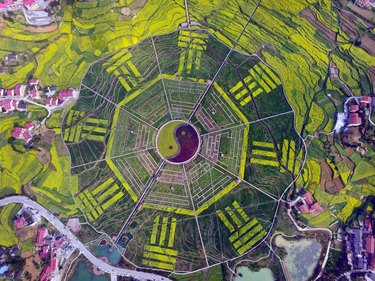The word "feng" is Chinese for wind, and "shui" means water. Both are vital when applying feng shui principles to your garden and the area outside your house. Water is one of the five traditional elements of nature, and wind refers to the free-flowing movement of ch'i, which is the Chinese word for energy.

The art of feng shui, which is arguably as old as Chinese civilization itself, seeks to establish harmony and good energy in the home by balancing the five elements in alignment with the home's physical orientation and the life purposes of the people that live in it. You can apply basic feng shui home principles to make the garden and the landscape an equally important retreat space as the inside of the home.
Video of the Day
Video of the Day
Feng shui isn't about achieving perfection; it's about balance. The structure and orientation of an existing home establish limitations that the feng shui practitioner addresses with "cures." Factors such as the existing backdrop, the neighborhood, and local climate establish limitations, but because you have more freedom of movement, there is usually more leeway for mitigation outdoors than indoors. The upside is that you can use feng shui outside the home to remedy problems inside.
Just as it does inside the house, clutter impedes the flow of ch'i and is a feng shui no-no, so keeping your landscape and garden clean is crucial. Here are 12 tips for designing and building your garden and landscape with good feng shui in mind.
Tip #1: Establish the Bagua
The word bagua refers to the eight directions (plus the center) of the space to which you're applying feng shui. The bagua is a type of map that creates nine zones that must be filled. Each direction has a meaning and color and is associated with one of the five elements. In the home, the front door is best located on the north wall, but in the garden, the entrance should be at the south.
Applying the bagua can be confusing, because it involves taking into account the internal bagua of the garden, as well as the orientation of the garden relative to the true compass directions. The "south side" of the garden isn't always due south—in fact, it's a happy coincidence if it is. There's no right way to deal with this inconsistency; it's just one of the factors to consider. For example, in an arid garden with its entrance to the east, you might want to emphasize the water element by placing blue flowers on the side facing north, which is the east side of the garden according to its internal bagua. Feng shui involves many judgment calls like this.
Every other direction in the garden's internal bagua should feature an appropriate plant, color or hardscape feature. For example, the side opposite the entrance is north and is the best place for a water feature. If your garden features unusual or colorful plants, they should be on the west side, and the east should be reserved for shrubs, ground cover or other greenery. Represent the earth element in the center of the garden with a rock garden or gazebo, and put the fire pit on the same side as the entrance.
Tip #2: Balance the Elements
The garden or landscaping needs to have an appropriate balance of the five elements: wood, earth, fire, water and metal. Naturally, wood and earth are going to be well represented in any garden, but you may have to make an effort to include the others. You can do this with color by painting a feature red to signify fire, silver for metal and dark blue for water, or you can do it with hardscape features, such as a fire pit, a wrought-iron fence or a pond.
Tip #3: Remember: Mountains Behind, Water in Front

The traditional feng shui idea of an appropriate setting is epitomized by any landscape painting of a lake nestled in a mountain valley. The feng shui mantra is: "Mountains behind, water in front." What this means for your landscape is that tall trees or buildings should create the backdrop, and some type of water feature, such as a pond or waterfall, should be visible in front of it. For this reason, feng shui advises against tall trees or other large objects in the front yard that obscure the background.
Tip #4: Put a Water Feature in Front of the House
One way to compensate for the lack of a mountain feature behind the house is to let the house itself be the mountain and place a water feature in the front yard. If possible, the water should be flowing, because flowing water invites good fortune and prosperity, especially if the flow is toward the front door. A round pond is especially auspicious and protects the house from poison arrows in the neighborhood.
Tip #5: Favor Meandering or Circular Walkways and Driveways

A straight walkway that extends directly from the street to the front door allows ch'i to move too quickly toward the house, which can be disturbing. A meandering walkway is better, especially if it's made of cobblestone or pavers. Line it with low shrubs to separate it from the rest of the yard and provide a clearly defined path to the front door.
A driveway that leads straight from the street to the garage isn't as problematic as a straight walkway, but one that curves is preferable. The option that best allows ch'i to flow is a semi-circular driveway with a clearly defined entrance and exit to the street.
Tip #6: Coordinate the Colors
Like the earth and wood elements they represent, the colors brown and green in all their various shades are usually already well represented in any garden. But if they are the only colors present, the garden or landscape will lack character. Red blue, purple and yellow flowers help create a balanced color palette, as do painted furniture, fencing and garden sculptures.
Use colors not only to bring in underrepresented elements, but also to blend the garden with its surroundings to create a soothing, natural environment. A garden with effective feng shui is a retreat space, and analogous color combinations contribute more effectively to quiet contemplation than dramatically contrasting ones.
Tip #7: Keep the Front Door Clear
Besides ruining the ideal feng shui symmetry of "mountain behind, water in front," large trees and shrubs in front of the house block ch'i from flowing around the front door, which is the main gateway of ch'i for the house. The space around the front door should be left clear to allow ch'i to move freely.

Plants with sharp needles, thorns and spiky leaves similarly block ch'i. They make you and your visitors feel uncomfortable and should also be avoided around the front door area.
Tip #8: Create a Secure Retreat Space
As a retreat space, the garden should promote a feeling of security, and a good way to do this is to build a stone wall or a rock garden. These and other features provide a viewing focus so the eye isn't left to wander aimlessly around the space. Adding a meandering pathway can attract people physically to these features and direct the flow of ch'i in a meaningful way.
A barrier around the yard reinforces the feeling of security. Whenever possible, use natural landforms or vegetation to create the barrier. The barrier shouldn't be a high wall, or you'll discourage the flow of ch'i altogether.
Tip #9: Invite Ch'i to Linger a Bit
To ensure a positive flow of ch'i inside the house, you should start by inviting it to flow outside. All the tips discussed so far are ways to create this invitation, but you still need to slow it down and encourage it to stay for a while. One way to do this is to provide accessible and attractive places for visitors to sit and relax.

Garden seating can be rustic or modern, depending on what best promotes a balance of the elements. If the garden has a focal point, the seating should direct the attention it to that point. If you have a long meandering walkway, provide places to stop and rest.
Tip #10: Don't Let the Tiger Dominate
In traditional feng shui, the area to the left of the front door, as viewed by someone standing in the doorway looking out, is the land of the dragon, which brings good fortune to the household. The area to the right is the land of the tiger. The tiger should never dominate by being higher than the dragon, or disharmony will arise in the household.
This issue has to do with the lay of the land. It's usually difficult and expensive to alter topography, but if you want to apply strict feng shui principles, you should take steps to create a downward slope from left to right. You can do this with hedges or with a water feature that flows from left to right.
Tip #11: Balance the Opposites
A balanced interplay of opposites, such as high/low, bushy/sparse, wet/dry and static/flowing is vital to the positive flow of ch'i. A feng shui practitioner refers to this as balancing yin and yang.
Don't allow either to dominate. If you have tall trees, plant shrubbery around them. If you create a rock garden, plant some flowers around it to complement the solidity of the rocks. Creating balance in this way brings forth the natural beauty of each component of your garden.
Tip #12: Follow Your Joy
The most important tip to remember when using feng shui to spruce up your garden and landscape is to follow your own intuition and do what makes you feel happy. In the end, the purpose of feng shui, whether you apply it to the outside of your home, the inside or a particular room, is to bring good fortune into your life. That means something different for everyone.
Feng shui is a bit of a science, but it's definitely an art, and art is creative. Let your home express your deepest sense of beauty, harmony and appreciation of nature, and and you'll be rewarded with a positive flow of energy that will fulfill you in every aspect of your life.
